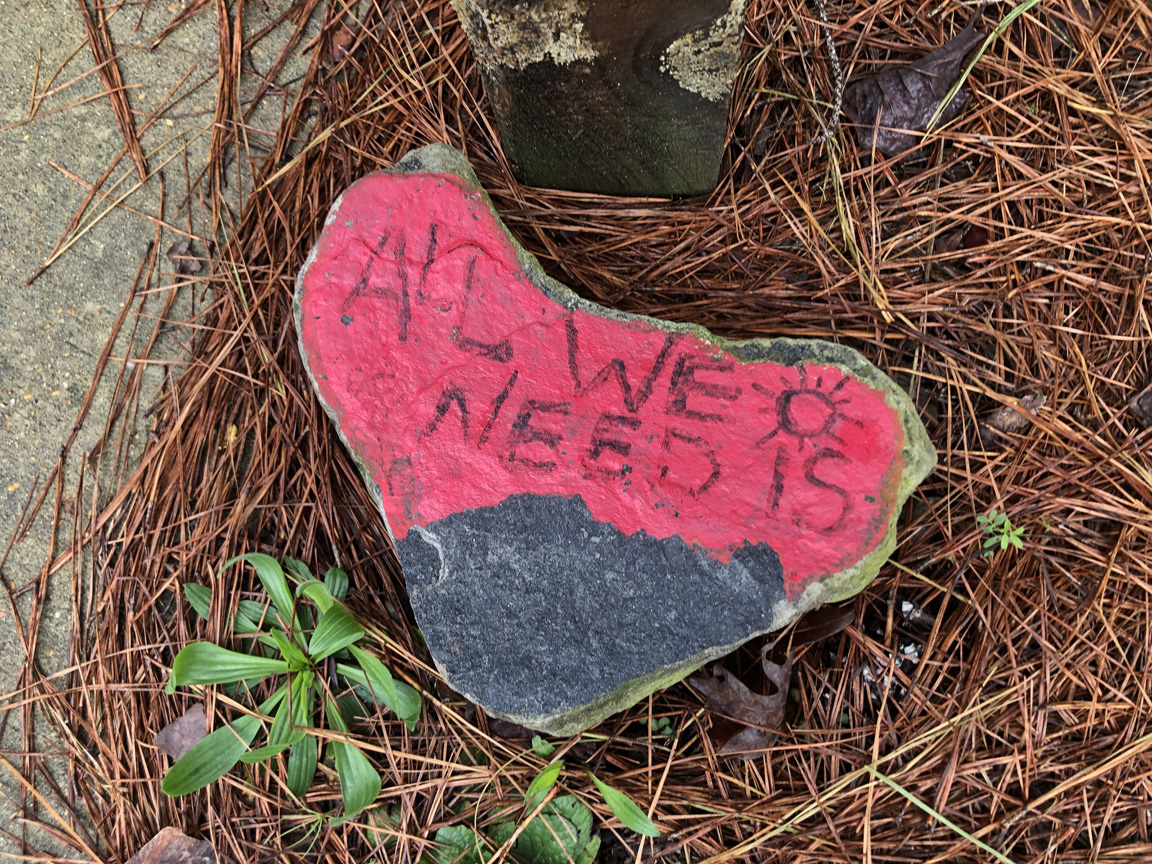
Along a path at Camp McDowell. Just fill in the blank!
“This Moment of Discipleship” was the theme of our House of Bishops retreat, wrapping up Monday night at Camp McDowell, deep in the Alabama countryside. In his opening sermon last Wednesday, Presiding Bishop Michael B. Curry sounded his usual rousing notes of challenge and reassurance. “Not one of us has ever been a bishop in this moment of the church’s life before,” he said, “There are no experts. There’s nobody who knows how to do it. [But] last time I checked my Bible, Jesus said, ‘Wherever two or three gather in my name, I’m going to show up.’”
When he does, our Lord will show us the way forward, not backward. Bishop Curry also quoted a colleague, talking about our changing church: “Christ is coming again. The 1950s are not.” Meeting in the deep south, we gave thanks for that. Our very meeting site was segregated until 1967. A bishop who was a camper during those years told me that when the first children of African descent were welcomed to Camp McDowell, friends bearing arms ringed the beautiful grounds for fear of KKK members known to be organized nearby.
The issue of race touched every bishop this week according to their temperament and experience. Last Thursday, we visited Montgomery to see the Legacy Museum, which persuasively draws a solid line between slavery and mass incarceration. The deepest horror I felt was at accounts of the animalistic rage, the sheer hatred, that whites hurled against the souls and bodies of the enslaved until 1865 and victims of Jim Crow in the years that followed. Inhumanity is too soft a word. It was non-humanity, the acts of creatures who were not fully evolved. Yet the assumption that in 1925, living in the south, I wouldn’t have done that is belied by the reality that in 1925, they did. Good people always struggled for justice against great odds. Some of us who are white would have stood tall during those wicked days in our country, but, inevitably, others would not have.
Because suspicion of the other at best, and hatred at worst, tends to be in our nature. Scapegoating comes too easy. Workers of color, instead of common sense immigration reform. Young Black men living in cities, instead of taking better care of all our people. Trans children, instead of working out what’s fair and right for everyone as God has made them. People of Chinese descent, instead of remembering our shameful history of holding our citizens responsible for the actions of foreign governments.
This isn’t wokeism. It’s nopeism — our society doing its best, at long last, to say no to the self-serving way of bigotry. To those who say that folks leverage identity to achieve political outcomes, I say welcome to plural democracy. It’s the only true democracy, born of Christ’s only true gospel of love. Our focus all week was Christian rather than civic discipleship. But there’s no space between the dignity of every human being (from the baptismal covenant) and people’s right to life, liberty, and the pursuit of happiness (from the slavery-coddling U.S. Constitution). Church and state are not separate when it comes to practice falling short of proclamation.
Awash in the prevailing pessimism about church future, bishops worry about falling short of others’ expectations, sometimes even our own. Rectors, vicars, and senior and bishop’s wardens, not to mention Altar Guild directors, church administrators, and social justice workers. Our week together bolstered the core dictum of spiritual direction, which invites directees to discern their unique purpose in God’s love, justice, peace, and righteousness project. Novelist, essayist, and journalist Sophfronia Scott, author, our keynoter, gently goaded us to let the wisdom of our personal narratives shape our ministries. In his closing homily, Michael Curry shared stories about his early months as bishop of North Carolina, laughingly admitting that he was trying to be some ideal of a bishop rather than the exact one he was.
Addressing this theme powerfully during a homily over the weekend was the Very Rev. Miguelina Espinal Howell, a chaplain to the House of Bishops and dean of Christ Church Cathedral, Hartford, CT. “God chose you for such times as this,” she told us. ”All who you are. All that you bring. You are not Wonder Woman, Superman, or Black Panther. You are you. You are you called and sustained by God — a human entrusted with an extraordinary gift to be a disciple and a leader in such times as this.” The dean and all our speakers urged us to walk humbly, take risks, and be willing to give up privilege and status. Of what should we be afraid, after all? He is Risen!
They were talking to us bishops, of course, but also to you, our fellow disciples. So let’s all tell and learn from our stories, even if we’re ashamed. Let’s discover and reveal our purpose, claim our joy, and look for one another and Christ along the way of love. With all people of faith who proclaim a word of love, may we be midwives of the better times these times will beget.
